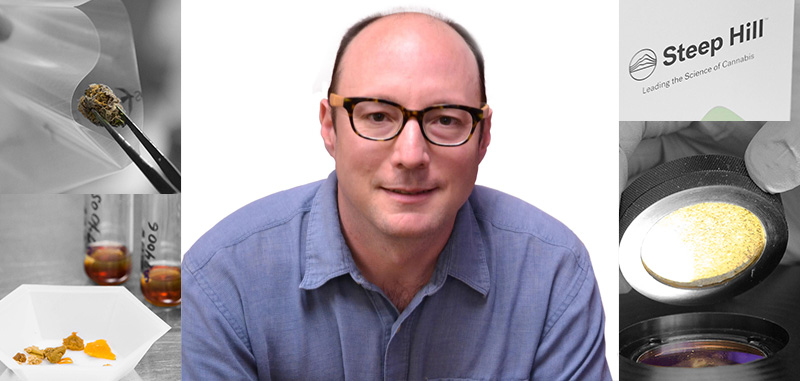David Lampach is the co-founder and CEO of Steep Hill, which was the first company to offer lab testing services to cannabis growers in 2008. Steep Hill has since become a staple of the cannabis industry with established locations in California, Colorado, Washington, and Nevada. As a pioneer of the standards and methodologies that have developed for scientific cannabis analysis, Steep Hill has managed to adapt and grow with the industry as it has developed in different states, demonstrating that legal cannabis presents enormous opportunities for businesses who are able to navigate the risks.
“The half century suppression of cannabis research in the United States has created a research vacuum to which scientific minds are naturally drawn.”
We recently asked David about how he wound up at the helm of the leading cannabis industry testing lab, what obstacles he faced while growing the business, and what advice he has for entrepreneurs and investors who are embarking on their own cannabis ventures. Read the full interview below!
Read the full interview:
Ganjapreneur: What were you doing before you founded Steep Hill?
David Lampach: I was cultivating cannabis under Prop 215 in California. Prior to 2002, I had a job as an equities trader on Wall Street.
As an equities trader, what led to your decision to switch careers and start growing cannabis under Prop 215?
I got tired of the Wall Street grind and living in Manhattan. Also, markets are very cyclical and it became more difficult to make money with the type of trading that I was doing. It seemed like a good time to make a change. Once I got to California I became hooked on the lifestyle and never looked back.
Was there a demand for cannabis testing at the time, or did the medical cannabis industry need to be educated about potency and microbial testing for it to catch on?
There was very little to no demand. We had to educate the public, and we continue to do so to this day. A very low percentage of industry players actually perform contaminants testing to this day. In order for testing to be widely accepted, it needs to be mandated, with real consequences for non-compliance.
Do you think at this point that there is a general consensus in the industry that testing should be mandated, or is it still a contentious issue among growers?
The general consensus of the industry is heavily in favor of more testing. There are a few hold outs from the “Cannabis never hurt anyone” camp who still believe that there should be no oversight or testing, but they are a dying breed.
What expertise did you draw on to develop the testing methods used by Steep Hill?
Living in the Bay Area provided me access to some really smart and exceptionally talented technical people who believed in what we were trying to accomplish. We leveraged their interest and resources to move the ball forward aggressively. We were very lucky to draw on this talent to accomplish our goals.
Is the idea of developing testing & research standards for cannabis particularly attractive to scientists because it represents a field that has been unexplored by the mainstream scientific community, and thus is likely to lead to new discoveries and breakthroughs?
Definitely. The half century suppression of cannabis research in the United States has created a research vacuum to which scientific minds are naturally
drawn.
What was one of the greatest obstacles you faced while growing the business?
HR issues stemming from the cannabis industry in particular. As the industry grows, there is a greater need for a high level of professionalism. It has been a challenge for many people in the industry to evolve with this need, which at times creates internal issues for companies.
Very interesting — does this mean that perhaps the transition from cannabis as a fringe industry to a mainstream industry is particularly difficult for the companies who have been around the longest? How do you think companies that originated early in what many would call the “grey market” can work to keep up with all of the start-ups entering the space?
The transition can be difficult for a number of reasons. I do believe it can be harder for older companies to bridge the gap, especially if the original founders or key employees are unable to make the transition. Early cannabis companies need to bring in professionals who are more capable of navigating the normal business culture.
How many people do you currently employ?
About 30.
How do you select your employees? Is experience with cannabis more important than traditional professional experience, are they about even in
value, or is it the other way around?
We look for people with a professional mindset, who are hard workers and willing to do whatever it takes. Traditional professional experience is more important at this juncture, but Steep Hill has a vast wealth of cannabis industry knowledge which heavily offsets any knowledge gap that new industry participants would have.
Where do you think the legalization movement will be in five years?
Based on the recent acceleration in mainstream acceptance of medical and recreational cannabis, I expect Federal reclassification of cannabis under the controlled substances act within the next 5 to 8 years. How far this goes will depend on a number of variables, but the current is strongly headed in that direction.
What is one piece of advice you would offer to an aspiring ganjapreneur?
When you are raising capital, don’t get hooked on valuation. Focus on building value. A small piece of a big pie is better than 100% of a small or non-existent pie. Look for win-win relationships. Leave something on the table for your partners.
Thank you for sharing your insights and experience, David!
For more information about Steep Hill Halent, visit their website. Questions or comments? Post them below!
End
